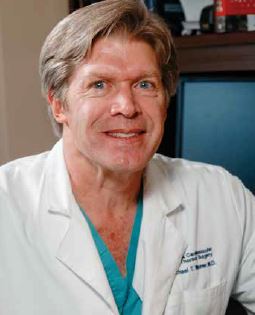Michael Weaver, MD
Dr. Michael Weaver has been performing cardiothoracic surgeries in the New Orleans area for over twenty years. He takes a two-pronged approach: he stays on top of all medical advances so that he can offer his patients the best of what is available, and he takes the time to educate his patients so that they can actively participate in their recovery. “It’s so important that patients maintain a positive attitude, take their prescribed medicines and take care of themselves,” said Dr. Weaver.
 How did you choose cardiovascular and thoracic surgery?
How did you choose cardiovascular and thoracic surgery?
During my residency in General Surgery, I had the opportunity to do a rotation with cardiothoracic surgeons. I fell in love with the technical aspects of cardiothoracic surgery and realized that I found it most rewarding and challenging to work with critical patients.
What does an average day look like?
I start my patient rounds between 6:30 and 7:30 in the morning. I’m in surgery from 7:30 until about 4:00 and then I continue with patient rounds in the evenings.
What sort of patients do you typically see?
Most of my patients are between the ages of 60 and 80. They typically present with conditions that affect the heart, such as coronary artery disease and peripheral vascular disease. I also see quite a few patients with lung abnormalities.
What surgical procedures do you perform most often?
Coronary artery bypass, where we’re grafting veins and arteries from other parts of the body to a patient’s coronary arteries, and heart valve operations, where we’re either repairing or replacing one or more of a patient’s heart valves.
Which surgery most challenges you?
Inserting a ventricular assist device (VAD)—or an artificial heart pump—in patients who have experienced heart failure. A VAD either partially or completely replaces the function of a failing heart. This procedure is almost always challenging and technically demanding because of the nature of dealing with an artificial pump and because patients who need a pump tend to be quite ill.
Have any recent medical breakthroughs changed the way you practice medicine?
VADs provide opportunities for patients who are not transplant candidates, and in the last few years, these devices have improved significantly in terms of providing survival and quality of life to recipients.
Additionally, endovascular stent grafts have allowed us to treat abdominal aneurisms without having to do an open surgical procedure. Instead, we can place a stent graft inside an aortic aneurysm using a thin plastic tube that will then contain the compressed stent graft. The result is that now we can extend patients’ lives with a much less invasive procedure.
What do you like most about your job?
Interacting with my patients and their families. They are very appreciative of the effort I put into their cases and understand that what I do is not routine.
What are the most important things people can do to keep their hearts healthy?
Exercise, lose weight, don’t smoke and eat fresh, healthy foods. My surgeries tend to be temporizing measures; if patients continue bad habits, whatever improved blood flow we’ve achieved will not last.
ADDRESS:
Crescent City Cardiovascular Associates
3715 Prytania Street, Suite 400
New Orleans, LA 70115
PHONE:
(504) 897-8276
RESIDENCY:
General Surgery, LSU Charity Hospital, New Orleans, LA
FELLOWSHIP:
Cardiothoracic Surgery, Oregon Health & Science University, Portland, OR
SPECIALTIES:
Cardiovascular and Thoracic Surgery
PHILOSOPHY:
“It’s important to individualize patient care so that patients understand how crucial their role is in their outcome.”
